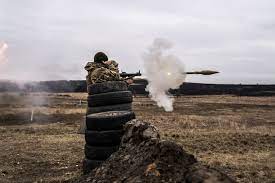The truth behind the EU’s new €5B weapons fund for Kyiv

Brussels: Europe’s new €5 billion fund for Ukraine was lauded as a big win for Kyiv, but the program is more of an accounting procedure than an actual pile of cash.
EU countries agreed Wednesday to create the Ukraine Assistance Fund, which ostensibly boosts the bloc’s off-budget European Peace Facility (EPF) with an extra €5 billion. The EPF is used to partially reimburse member countries for the weapons they provide to Ukraine.
But despite its name, the “fund” won’t actually see a €5 billion infusion — as bilateral weapons shipments can count as “in-kind contributions.”
The end result will still mean billions of euros worth of weapons are sent to Ukraine — some of them directly by donors, whereas if countries give less they’ll have to actually pay into the fund.
Bilateral arms shipments to Ukraine will be discounted from cash contributions to the fund at a level of around 43 percent. That means that for every €2.30 in weapons that a country gives Ukraine, it can deduct €1 from what it owes to the fund.
For all countries, this means that as long as they give enough bilateral aid, they won’t have to give any new cash to the fund.
It’s “creative accounting,” one official told POLITICO’s Brussels Playbook.
Germany, for example, has to chip in around €1.2 billion a year, but as long as it gives Ukraine at least €2.4 billion in weapons, it will be off the hook. This year Berlin has pledged it will give €7 billion.
Germany has already said it will count its own arms shipments as its contribution.
However, some countries will likely prefer to send money to the fund rather than give weapons directly to Ukraine, a senior EU official said.
“The bilateral in-kind contributions make sense for countries that have a big weapons industry, as they can buy from their own producers,” the official said.
But that dry accounting procedure belies the excited talk in Brussels that greeted Wednesday’s deal.
EU leaders, who took weeks to reach agreement on the package amid objections from France, Germany and Hungary, promptly flourished the deal as a victory for the EU and Kyiv, which desperately needs more weapons and ammunition.
“We made it,” the EU’s top diplomat Josep Borrell tweeted. “The message is clear: we will support Ukraine with whatever it takes to prevail.”





